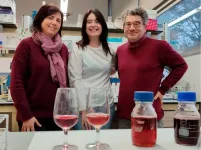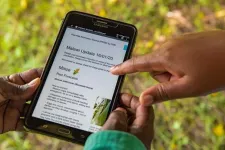(Press-News.org) Small omnivorous and insectivorous dinosaurs may have flapped small, feathered primitive wings to scare prey out of hiding places, according to a study published in Scientific Reports. The authors built a robot dinosaur named Robopteryx to investigate how grasshoppers responded to different potential scaring behaviours, and speculate that the results could help explain why feathered wings evolved before they were capable of flight in some types of dinosaurs.
Although the remains of numerous species of feathered dinosaurs have been discovered, so far only members of one group of dinosaurs known as Pennaraptora have been discovered with pennaceous feathers — the type of feathers required for flight. Fossils show that these developed first on small primitive or proto-wings that were not strong enough for flight and whose functions are currently unknown.
Jinseok Park, Hyungpil Moon, Yuong‑Nam Lee, Sang‑im Lee, Piotr Jablonski, and colleagues hypothesise that the proto-wings may have been used for ‘flush-pursuit’ foraging, a hunting strategy observed in multiple species of contemporary insectivorous and omnivorous bird species such as the greater roadrunner (Geococcyx californianus) and the northern mockingbird (Mimus polyglottos). This strategy consists of predators using displays of contrasting-coloured feathers on their wings and tails to startle prey out of hiding and into fleeing, at which point they can be pursued and caught.
The authors built a robot named Robopteryx to test their hypothesis, basing it on the size, shape, and estimated movement range of the pennaraptoran dinosaur Caudipteryx — a two-legged, peacock-sized predator that lived approximately 124 million years ago. They then used Robopteryx to imitate several variations of flush-pursuit display behaviours — with the full sequence consisting of spreading the proto-wings and raising a tail, pausing with them outstretched, then folding them back — and observed the behavioural response of grasshoppers to the display behaviour. Grasshoppers were used as they respond to flush-pursuit display behaviour and belong to the order Orthoptera which existed concurrently with Caudipteryx.
The authors found significant positive associations between the use of the proto-wings in the display behaviour and both the likelihood of the grasshopper fleeing — with 93% of tested grasshoppers fleeing when the proto-wings were used compared to 47% without — and how far away Robopteryx was when they fled. They also found significant associations between both the presence of white patches on the proto-wings and the presence of feathers on the tail and the likelihood of the grasshopper fleeing.
The authors conclude that their results with Robopteryx support the flush-pursuit hypothesis, and provide a new perspective on why feathered wings and tails may have initially evolved in dinosaurs.
END
Palaeontology: Small dinosaurs flapped their feathers to scare prey
2024-01-25
ELSE PRESS RELEASES FROM THIS DATE:
Gaps in the vision screening pathway for school-aged children
2024-01-25
About The Study: The current approach to vision screening in the U.S. may not adequately provide care to all children. At each stage along the care pathway, children from historically marginalized racial and ethnic groups, low-income households, and non–English language speakers experience worse outcomes—they were less likely to receive screening, more likely to be referred for failed screening, and less likely to establish care with a specialist. High referral rates in these vulnerable groups may suggest higher prevalence of undiagnosed conditions or elevated false-positive results from suboptimal screening strategies.
Authors: Isdin Oke, M.D., M.P.H., ...
Suicidal thoughts and trajectories of psychopathological and behavioral symptoms in adolescence
2024-01-25
About The Study: This study of 2,780 adolescents found that persistent withdrawn symptoms and increasing somatic symptoms during early to mid-adolescence were associated with an increased risk of suicidal thoughts in mid-adolescence, even after accounting for comorbid symptoms and confounders. Attention should be paid to the suicidal risk associated with these symptoms, particularly when they persist or increase in the longitudinal follow-up.
Authors: Shuntaro Ando, Ph.D., of the University of Tokyo, is the corresponding author.
To ...
An unconventional yeast increases the quality of carbonic maceration wine, rosé wine and orange wine
2024-01-25
Carbonic maceration wines are increasingly in demand on the market. They are young red wines in which floral and fresh fruit aromas predominate and they must be consumed within the first year. The best-known example is Beaujolais nouveau in France, but there is also a tradition in La Rioja and Catalonia, especially in the Montsant area and the Conca de Barberà.
Research by the URV has found that the quality of these wines can be increased by using an unconventional yeast that considerably improves their organoleptic properties and speeds up the malolactic fermentation process. ...
BU’s Thanh Nguyen, MD, elected President of the Society of Vascular and Interventional Neurology
2024-01-25
FOR IMMEDIATE RELEASE, January 25, 2024
Contact: Gina DiGravio, 617-358-7838, ginad@bu.edu
BU’s Thanh Nguyen, MD, Elected President of the Society of Vascular and Interventional Neurology
First woman to serve as president of the society
(Boston)—Thanh N. Nguyen, MD, FRCP, FSVIN, FAHA, professor of neurology, radiology and neurosurgery at Boston University Chobanian & Avedisian School of Medicine, has been elected President of the Society of Vascular and Interventional Neurology (SVIN), the first woman to serve in this role in its 17-year history.
Previously, Nguyen was an elected board member of SVIN in 2008 and ...
C-Path promotes Cécile Ollivier to Vice President of Global Affairs, expanding leadership in drug development
2024-01-25
AMSTERDAM and TUCSON, Ariz., January 25, 2024 — Critical Path Institute (C-Path) today announced the promotion of Cécile Ollivier, M.S., from Managing Director, Europe to Vice President of Global Affairs.
“We are thrilled to announce the promotion of Cécile Ollivier to Vice President of Global Affairs,” said C-Path Board member Tomas Salmonson Ph.D., M.S. “Cécile has been an invaluable contributor to our European operations, and her extensive experience in global drug development and regulatory science makes her the ideal choice for this expanded role. Her leadership will ...
David Brydges wins 2024 Dannie Heineman Prize for Mathematical Physics
2024-01-25
WASHINGTON, Jan. 25, 2024 – AIP and the American Physical Society (APS) are pleased to announce David Brydges as the recipient of the 2024 Dannie Heineman Prize for Mathematical Physics “for achievements in the fields of constructive quantum field theory and rigorous statistical mechanics, especially the introduction of new techniques including random walk representation in spin systems, the lace expansion, and mathematically rigorous implementations of the renormalization group.”
This annual award recognizes significant contributions within the ...
African smallholder farmers benefit from reduced crop losses and higher incomes from a novel pest alert service
2024-01-25
A newly published review of the CABI-led Pest Risk Information Service (PRISE) project shows that smallholder farmers in four African countries who received pest alerts created using earth observation data benefitted from reduced crop losses and higher incomes compared to farmers who did not.
Crop pests are the major cause of loss of smallholder productivity resulting in negative impacts on livelihoods – the estimated the economic impact of invasive alien pests alone on Africa’s agricultural sector is USD $65.58 billion a year (CABI, 2021, CABI Agriculture and Bioscience).
This review is a keystone ...
Cervical cancer rates rising in low-income U.S. counties
2024-01-25
HOUSTON ― Women in low-income areas of the U.S. face a stark rise in cervical cancer incidence and mortality, according to a new study led by researchers from The University of Texas MD Anderson Cancer Center.
The results, published in the International Journal of Cancer, demonstrate that the incidence rate for distant-stage cervical cancer has increased most among white women living in low-income counties, at 4.4% annually since 2007. The largest increase in cervical cancer mortality rates occurred ...
Press registration opens for ACS Spring 2024
2024-01-25
Journalists who register for the American Chemical Society’s (ACS’) upcoming hybrid meeting and exposition — ACS Spring 2024 — will have access to nearly 12,000 presentations on topics including agriculture and food, energy and fuels, health and medicine, sustainability, and more. ACS Spring 2024 is being held virtually and in person in New Orleans on March 17-21, with the theme “Many Flavors of Chemistry.”
ACS considers requests for press credentials and complimentary meeting registration from reporters ...
UTSA to establish new college in AI, cyber, computing and data science
2024-01-25
UTSA announced a pioneering initiative to reshape its academic landscape with the creation of a new college dedicated to artificial intelligence (AI), cybersecurity, computing, data science and related disciplines. This initiative aligns with the university's commitment to innovation and academic excellence while also positioning UTSA to lead in the rapidly evolving landscape of advanced technologies.
Nearly 6,000 students are enrolled in AI, cyber, computing and data science-related degree programs at UTSA, reflecting ...





